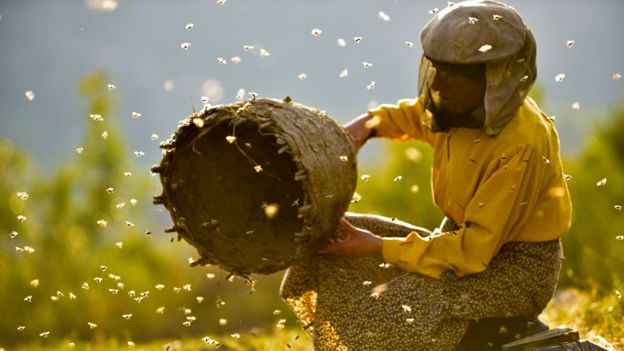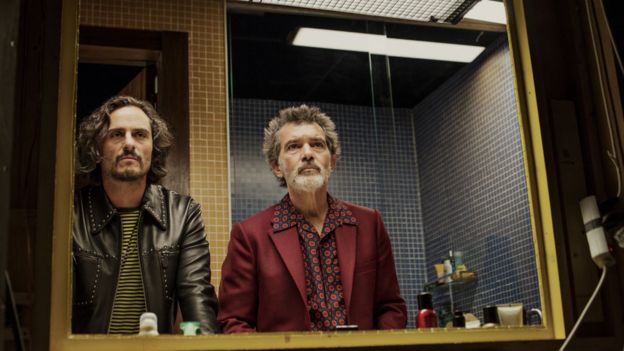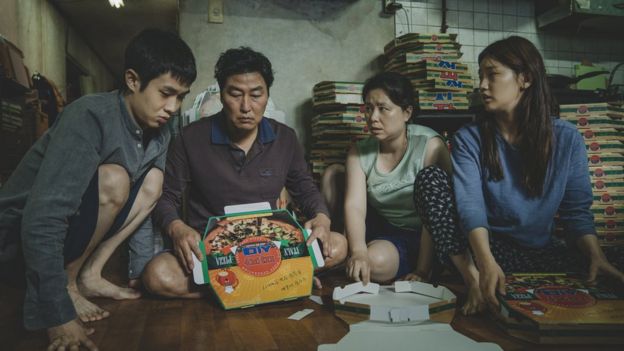
The Academy Awards have a new category this year - in name at least.
There has been an Oscar for best foreign language film since 1947, although the title could vary in the early years. But when two years ago producers Larry Karaszewski and Diane Weyermann took over running the category it didn't take long to decide the old title should go.
Karaszewski said last year: "The word 'foreign' was starting to seem strange, because there was really nothing foreign about the movies that we were seeing. They were just not in the English language."
So now Academy members are voting to choose the best international feature film.
The submission rules remain unchanged - one film per country with limited amounts of English dialogue.
But the voting procedure has always been more complex than for most categories and more differences have been instigated.
The most significant is that shortlisted films can be watched online. This allows more Academy members to participate in the voting process.
More than 90 films submitted have come down to a final five. Here we give an overview of each.

Country: Poland
Language: Polish
Poland's track record in this category: Eleven previous nominations including one win.
Director: Jan Komasa
What's it about?: Daniel is a young man living in a tough juvenile detention centre where violence is common. He's allowed out to travel to a village in the countryside to work in a sawmill. The village priest comes to assume Daniel has just left a Catholic seminary and appoints him his unofficial stand-in while he goes away. It could all be the set-up to a comedy of mistaken identity - and there is humour in the film. But Daniel (played by Bartosz Bielenia) offers the villagers the emotional consolation they needed after a recent tragedy but which never materialised. They accept and perhaps even love him (though some of them may suspect he's not what he claims to be). The violent Daniel blossoms into something far better but then reality lunges into view.
Chances of winning: At the film's centre is a remarkable performance by Bartosz Bielenia, working with a strong screenplay based loosely on real events. Bielenia shows Daniel's hardened viciousness but slowly allows the audience to sense goodness growing inside him - perhaps even a soul. A man devoid of morality becomes the most moral person in the film. It's hard not to care about his fate, though the audience guesses his pretence will be discovered eventually. Though it's not likely to win, the careers of Bielenia and director Komasa will benefit.

Country: North Macedonia
Language: Turkish and Macedonian
North Macedonia's track record in this category: One nomination, as Macedonia, in 1994
Directors: Tamara Kotevska and Ljubomir Stefanov
What's it about?: It's a documentary, focusing on the tough lives of Hatidze Muratova (who's in her 50s) and her mother Nafize in countryside a few miles from the capital Skopje. Hatidze, an absolute gift for any documentary-maker, survives mainly by keeping bees and selling their honey at market. A family moves in nearby: any initial suspicion is soon replaced by warmth as Hatidze accepts them almost as her own. The bees become a joint project. But financial pressures encourage the newly arrived family to over-harvest the honey. Problems emerge.
Chances of winning: It's rare a documentary gets nominated in this category. (The film is also nominated for best documentary feature.) It was shot over a period of three years by a small crew: the result was 400 hours of rushes which have been expertly edited down. There are a few moments which feel as if they may have been recreated for the camera but overall it's an insight into a life most audiences will know nothing about. No documentary has yet won in the category but Hatidze's personality alone makes the film worth seeing. The directors have now bought her a new house.

Country: France
Language: French
France's track record in this category: 40 nominations with 12 wins. (Only Italy has won more often)
Director: Ladj Ly
What's it About?: Abandon thoughts of Jean Valjean, Inspector Javert and anthems sung on barricades. The film takes its title from the Victor Hugo novel but it's set in the modern social housing estate of les Bosquets in eastern Paris. (Parts of the book are set around the same area.) Stéphane is a policeman transferred to a unit which patrols the tough neighbourhood by car. Tensions, some racial, simmer with residents. The two officers Stéphane is assigned to - one white, one black - have learnt to cut corners if they see the need. A lion cub is stolen from a circus, which at first seems almost comic. Then a violent incident occurs which the police need to hide. But a complication emerges: the incident was filmed from a drone.
Chances of winning: Director Ladj Ly is from a Malian immigrant family and grew up in the area, where there were big riots in 2005. It's his first feature film and it took the Jury Prize at Cannes last year. Much of the screenplay works well as a police procedural but it's strange that though he digs into the policemen's characters we're left needing to learn more about individuals in the community. At times plot and characterisations don't convince. Stéphane comes across as improbably naive about colleagues' attitudes to policing a tough beat and the background of day-to-day life for the mainly African families barely registers. There's ample tension in the first half but as mayhem kicks off the story loses some of its grip.

Country: Spain
Language: Spanish
Spain's track record in this category: 19 nominations, including four wins
Director: Pedro Almodovar
What's it about?: Salvador Mallo (played by Antonio Banderas) is a respected Spanish film-maker who's financially well-off but beginning to feel his age - it's not clear he will ever make another film. His health is failing and he is increasingly prone to depression and dependence on drugs. In extended flashbacks to childhood we see his love for his mother (played by Penelope Cruz), the first stirrings of gay sexuality and the sparky intelligence which set him apart as a boy. Struggling to rediscover a creative path, Mallo goes to visit the star of an early hit with whom he fell out many years ago.
Chances of winning: Almodovar (now 70) has been nominated twice before in this category and won in 1999 for All About My Mother. He also took an Oscar for his screenplay for Talk to Her so he's a known quantity with Oscar voters. Almodovar insists Pain and Glory isn't explicitly autobiographical but there are clear parallels with his own life. The film's attractively shot and designed and the performances are excellent. The story's quieter and more considered than many of his early works though sometimes it feels the director is revisiting old ground. But if there's one thing Academy members love it's a screen full of good-looking people lamenting how tough it is to be a film-maker.

Country: South Korea
Language: Korean with a little English
South Korea's track record in this category: It's the first South Korean film nominated in this category
Director: Bong Joon Ho
What's it about?: The film is a dark and intricately worked out farce with a strong streak of class-based satire (and with more violence than farce normally involves). The Kim family lives in a crowded "semi-basement" where they just about get by financially. A friend suggests the son could make cash filling in for him as tutor to a wealthy but wildly dysfunctional family. One-by-one the existing domestic staff disappear as he schemes to get his entire family employed. The Kims seem secure financially at last. Of course fate has other ideas.
Chances of winning: Parasite took the Palme d'Or at Cannes last year and has just won best film not in the English language at this year's Baftas. There are many Hollywood executives who since then have wished they'd come up with the story, thrown it to a US writer and sat back to await the Oscar plaudits. As well as best international film it's nominated for best picture, best director, best screenplay, best editing and best production design. It's worth buying a ticket just to ogle the gorgeous house for a couple of hours (it was built especially on a movie lot). Many see the film as the most predictable of shoo-ins at this year's Oscars. Some Academy members may feel it's wasteful to hand the award to a film likely to win in other categories... though last year Roma took best foreign language film despite having nine other nominations.
If Parasite does win, and after Alfonso Cuaron's success last time, does that suggest this category is undergoing a fundamental shift toward the mainstream? Is the era over when an accomplished but little-noticed film could come from nowhere to take this Oscar?